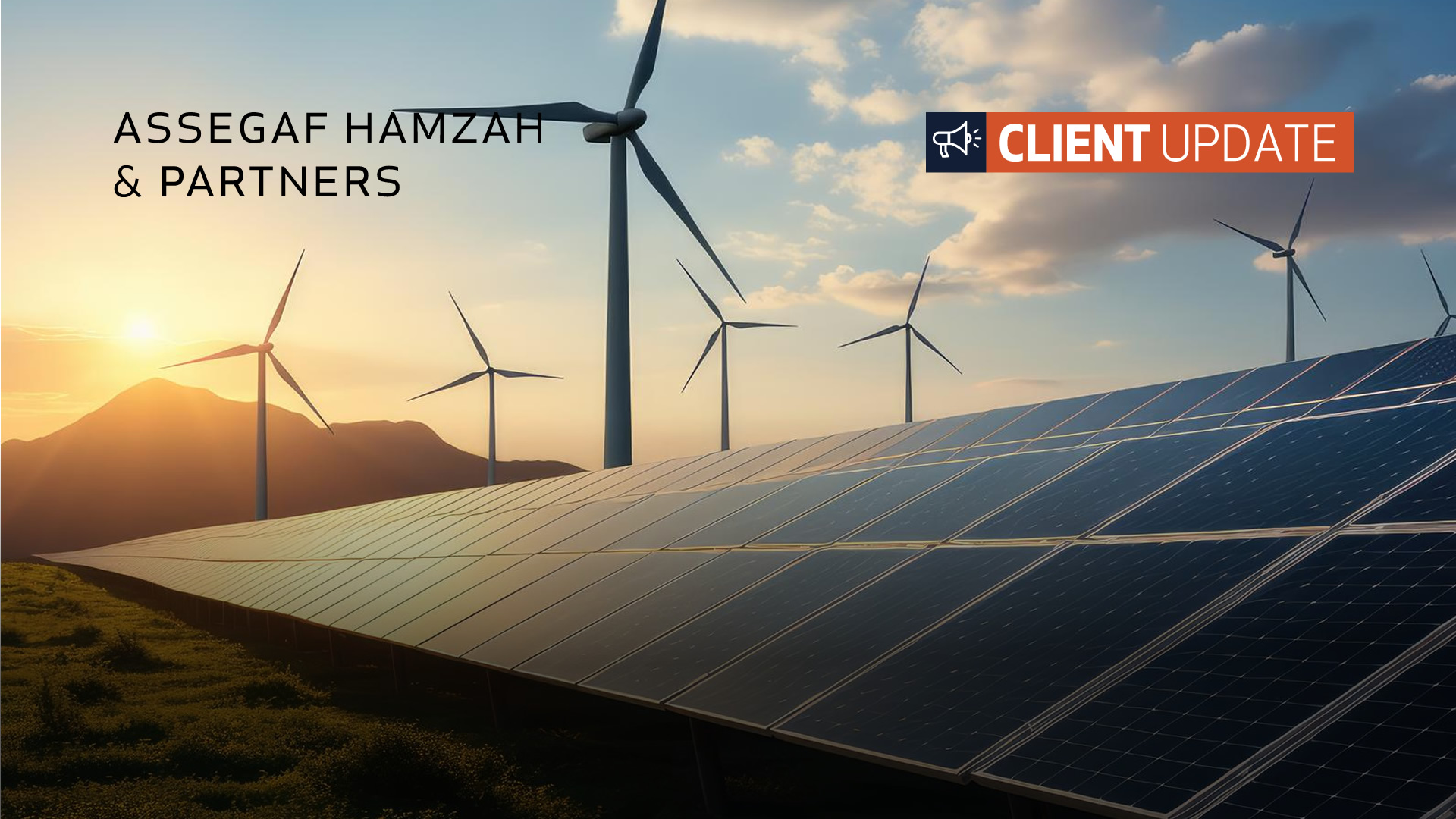Time to Reflect on Indonesia’s Local Content Requirement for Renewable Energy

By 2025, the Indonesian government aims to achieve a minimum of 23% renewable energy in the national energy mix and 31% by 2050. Despite the ambitious target, the Electricity Law (Law No. 30 of 2009 as amended by Government Regulation in lieu of Law No. 2 of 2022) requires independent power producers (“IPP”) to prioritise the use of domestic products in developing power generation projects, including renewable energy projects. This means that IPPs must comply with the minimum local content requirements (Tingkat Komponen Dalam Negeri), which apply for goods and services, in the development of electricity infrastructure. Failure to comply with these local content requirements may result in administrative and financial sanctions.
The local content requirements are stipulated under Minister of Industry Regulation No. 54/M-IND/PER/3/2012 on Guidelines for the Use of Domestic Products for the Development of Electrical Infrastructure and its amendment from time to time (“Regulation 54/2012”). Regulation No. 54/2012 has undergone several amendments, with the most recent in 2023, encompassing local content requirement for the module of solar power plants (pembangkit listrik tenaga surya or “PLTS”) and exemptions on local content requirements for PLTS in Ibu Kota Nusantara. It is imperative to note that most of the local content threshold under Regulation 54/2012 dates to 2012, and consequently, the threshold does not reflect the current market condition for renewable energy power plants.
Drawing from past transactions and experience, we will discuss the imperative need to revise the calculation and stipulation of the local content requirements for renewable energy projects.
Local Content Threshold
Under Regulation 54/2012, the current local content requirements for the two largest capacities of each type of power plants are as follows:
-
Geothermal power plants (pembangkit listrik tenaga panas bumi or “PLTP”):
Type of PLTP Local Content Requirements Goods (%) Services (%) Combined Goods and Services (%) Installed capacity more than 60 MW up to 110 MW per unit 16.3 60.1 29.21 Installed capacity of more than 110 MW per unit 16 58.4 28.95 -
Hydroelectric power plants (pembangkit listrik tenaga air or “PLTA”):
Type of Non-Storage Pump PLTA Local Content Requirements Goods (%) Services (%) Combined Goods and Services (%) Installed capacity more than 50 MW up to 150 MW 48.11 51.1 49 Installed capacity of more than 150 MW per unit 47.82 46.98 47.6 -
PLTS:
Type of PLTS Local Content Requirements Goods (%) Services (%) Combined Goods and Services (%) Scattered-Stand Alone PLTS 39.87 100 45.9 Centralised-Stand Alone PLTS 37.47 100 43.72 Centralised-Grid Connected PLTS 34.09 100 40.68
Regulation 54/2012 also imposes sub–local content requirements to each of the power plant main components. For instance, the module of a PLTS (solar) power plant must meet the 40% local content requirement, which will be increased to 60% by 1 January 2024. Specifically for the construction of geothermal power plants, in addition to the above threshold, Regulation 54/2012 also requires that the construction must be carried out by domestic construction companies.
It is not clear from the Regulation how these thresholds were calculated and how they are achievable in the current Indonesian domestic market. Moreover, there is currently no procedure for the government to approve any deviation or adjust the threshold if the domestic market does not permit the local content requirement to be achieved.
Sanctions for Failure to Comply with the Local Content Requirements
Regulation 54/2012 imposes the following administrative sanction and financial penalty to an IPP for the failure to meet the local content requirements:
Administrative sanctions
An IPP may:
-
Receive a written reprimand for the failure to achieve the local content threshold, failure to disclose information related to the local content assessment, and local content fraud; and
-
Be blacklisted as an IPP for two years if the local content deficiency is more than 5% of the required local content target or if the IPP does not utilise domestic production at all.
On the blacklist, Regulation 54/2012 does not specify which blacklist is being referred to. However, based on market practice, it is likely to mean that the IPP will be blacklisted from PT Perusahaan Listrik Negara (Persero)’s shortlist of IPP.
Financial penalties
Penalties are imposed and payable as non-tax state revenue if the local content achieved at the end of the project is less than the value of local content required under Regulation 54/2012:
-
A tariff of 0.3‰ of the total contract value for every 0.01% deficiency in achieving the required local content threshold; and
-
The penalty is capped to 10% of the contract value if the deficiency exceeds 5% from the local content threshold.
However, there is no clarity under Regulation No. 54/2012 as to which contract value will be the basis of the penalty calculation. Based on market understanding, the financial sanction will be based on the Engineering, Procurement, and Construction (EPC) contract.
Can the Industry Meet the Required Threshold?
Based on several transactions in the past five years, we have seen a growing trend that the renewable energy industry is not able to meet the local content threshold. This holds true even when we are dealing with prominent state-owned enterprises and their affiliates. The reason for this failure is mostly because of the lack of domestic supply, or even if there is domestic supply, those domestic supply does not meet the technical requirements of the project.
The next question to naturally ask is whether the IPP could request waiver from the government. While the theoretical answer is yes, its application is challenging.
Additionally, it is noteworthy that under Regulation 54/2012, an IPP may import goods and services if the domestic market is: (1) unable to produce the goods; (2) unable to meet the required specifications; or (3) unable to meet the quantitative demand of the project. However, Regulation 54/2012 does not stipulate any procedures on how the Ministry of Industry is going to issue an exemption to the local content threshold, and we have not seen any standard practice on the application for waiver. Thus, this legal void has created inconsistencies of practice and approach, which in turn may affect the economics of the renewable energy projects.
Learning from the Upstream Oil & Gas Local Content Requirements
While Regulation 54/2012 provides little room for the local content requirements to adjust with the market conditions, the local content requirements that apply to the upstream oil and gas industry is dynamic, adjusting to the current market conditions.
Referring to Minister of Energy and Mineral Resources Regulation No. 15 of 2013 on Usage of Local Products in Upstream Oil and Gas Business Activities and SKK Migas PTK 007, the government has issued a specific list of goods divided into several categories: (1) goods that is must be used (because the domestic industry is strong enough to supply); (2) goods that must be maximised to be used; and (3) the goods that must be empowered. The list is outlined in the Book of Domestic Product Appreciation (Buku Apresiasi Produk Dalam Negeri or “APDN Book”). The APDN Book is issued periodically to ensure that it reflects the current conditions of the relevant market.
In addition, the local content threshold is calculated by the upstream oil company contractors and stipulated differently to each project (among others, depending on the market conditions at the time of the project) where bidders who could commit to higher local content thresholds would receive price preference during the tender process. Adopting the method to determine the local content requirement imposed in the upstream oil and gas industry to the renewable energy industry may allow for the local content requirements in the renewable energy industry to be aligned with the current market conditions, instead of hindering the development of renewable energy – which should be the greater goal of the government.
If you have any queries on the above, please feel free to contact our team members below who will be happy to assist.
Have any Question please contact
Rafi Yuszar Hanif also contributed to this alert.



